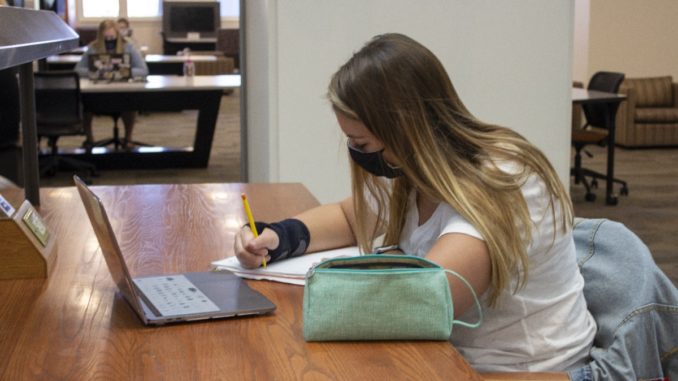
The Truman State University Executive Leadership Team will be making a decision during the coming weeks about the spring semester calendar. The main factors being considered for the decision are Centers for Disease Control and Prevention guidelines and student and faculty feedback.
A survey was sent out to students, faculty and staff asking them to rank four options. The first option was a typical spring semester with breaks, including spring break. The second option would eliminate spring break but would start a week later. With the third and fourth options, the semester would start at the same time, but instead of spring break there would be smaller breaks divided throughout the semester, each option having different days off.
Janna Stoskopf, vice president of student affairs, said the data from the survey had not been fully analyzed as of Oct. 16, but there appeared to be differences between the preferences of the faculty and students.
“A lot of the decisions that we make about how to handle things like COVID and decisions about the semester are really done with a lot of intentionality, keeping in mind what the CDC is saying, keeping in mind what other universities are looking at doing and really trying to find what is the right place for us to be and what is in the best interests of our students, which may or may not be the same as what other campuses are doing,” Stoskopf said.
Listen to this week’s episode of Dry Ink on this story
Janet Gooch, vice president for academic affairs and provost, said she hopes a decision will be made soon so students can plan accordingly. She said the decision will most likely be made within a week or two.
Gooch said the Executive Leadership Team is trying to anticipate and plan for the spring semester without knowing what the COVID-19 situation will be. However, she said she thinks the situation will be similar to what it has been in the fall semester.
Gooch said it is important that the spring calendar promotes not only what’s in the best interest of Truman students, but also what’s in the best interest of the world. She mentioned that it was around spring break last year when the pandemic heightened, so students returning from traveling and gathering back on campus was a major concern. The potential risks of students traveling or leaving campus in general is another factor in deciding the spring semester calendar. However, she said she also understands the difficulties of a semester without breaks.
“This semester we’ve heard frequently from faculty and students that it’s been hard to go without breaks, and so certainly that’s a consideration,” Gooch said. “That’s why three of the options did have breaks.”
Stoskopf said she also recognized the difficulty of a semester without breaks.
The way the University condensed the fall semester, along with the stress of not having any breaks has really impacted students, Stoskopf said.
“I think from a student perspective the closer we can be to normal the better, and I think that’s probably true in general,” Stoskopf said. “I don’t know if that’s where we’ll land or not, and it’s the same dilemma really that we had with establishing the fall semester schedule.”
Gooch said while she knows the lack of breaks or many other measures will not completely prevent students from traveling, the message the spring calendar sends is important. She pointed out that weekend breaks don’t allow students enough time to travel as excessively as a nine day break would.
In making a decision, Stoskopf said the Executive Leadership Team is evaluating the pros and cons of a semester without breaks, keeping in mind how the fall semester has gone. She said some of the benefits of a semester without breaks are that students are less likely to travel extensively and a longer break between semesters, which could allow them to limit activity before returning to campus.
The downsides are that students are more stressed, and professors could feel like they are having to teach the same amount of content in less time, even though the number of days of school remain the same as in past semesters. Stoskopf said ultimately there will be people who are unhappy with the decision.
“I hope that when the decision is made, that students, faculty and staff just keep in mind that we’re not interested in angering students or interested in losing students because we made a schedule change that they didn’t like,” Stoskopf said. “We are interested in making sure we can provide a quality education in an environment that safeguards their wellbeing, and that relies on all of us to do our part.”
